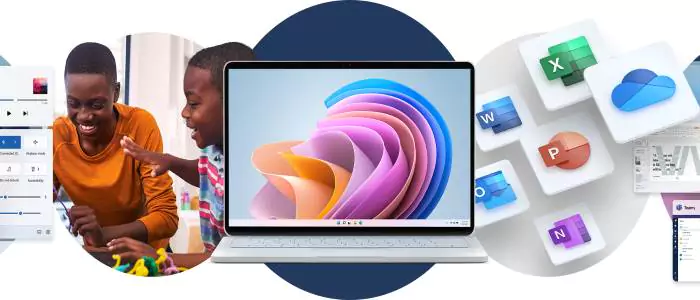
Microsoft Educator Course
Tally Course, Tally ERP 9, Spoken English Classes, Digital Marketing Course, Python for Beginners, Java Programming, Graphic Design Course, Website Development Course, Internship
Microsoft Educator Course
Course Detail
Microsoft Educator

By enrolling in the Microsoft Certified Educator program, educators will get the skills needed to provide rich, customized learning experiences to their students that integrate important 21st century learning skills using Microsoft tools. ACT aims to help the aspirants get access to this program from Microsoft and help them flourish in their specific area of teaching. For successfully passing the exam, you will want to master the 21CLD curriculum and have a working understanding of a variety of Microsoft tools. 21CLD or 21st Century Learning Design helps teachers redesign their lessons and learning activities to develop their students’ 21st century skills
We have the best courses for you!
Enroll today and learn something new.Syllabus
Module 1
Determine the level to which a learning activity meets the rubric for collaboration:
- prepare activities that enable students to work together, have a shared responsibility fordeliverables, make decisions that are substantive and crucial to learning activity success,and work interdependently.
- analyze, evaluate, design, and manage the learning environment to facilitate student Collaboration, given a set of resources available in a classroom
- Virtual environment; physical environment; software tools available.
Modify a learning activity to meet the rubric for the highest level of skilled communication:
- prepare activities that enable students to create product deliverables that convey a set of Connected ideas, are multimodal, require supporting evidence, and are designed for a Specific audience
Evaluate student product examples to determine the level to which they meet the skilled Communication rubric:
- evaluate student product examples on the use of connected ideas, multimodal approach,Supporting evidence, and design for a specific audience
Module 2
Determine the level to which a learning activity meets the knowledge construction rubric:
- prepare interdisciplinary activities that enable students to apply knowledge in a new Context
Transform a didactic learning situation into an activity that requires students to apply:
- prepare activities that enable students to spend their time and effort developing Knowledge that is new to them and participate in interdisciplinary learning activities
Determine the level to which a learning activity meets the rubric for self-regulation:
- prepare long-term activities that enable students to plan their own work and revise work based on feedback
Determine which opportunities facilitate an environment of self-regulation:
- provide students with opportunities to set their learning goals, decide on the best Strategies to achieve these goals, and monitor to see if these strategies are working.
Module 3
Determine the level to which a learning activity meets the rubric for real world problem Solving:
- prepare activities that enable students to develop a solution to a problem that is new to Them, complete a task that they have not been instructed how to do, or design a Complex product that meets a set of requirements
Select a strategy to encourage students to problem-solve, innovate, and apply a solution that benefits others in the real world:
- Develop learning objectives that involve real-world issues.
Determine the level to which a learning activity meets the rubric for use of ICT learning:
- prepare activities that enable students’ use of ICT to support knowledge construction; Address the needs of diverse learners
Fulfill student learning outcomes by using Microsoft technology tools:
- Identify the skills required to implement the resources.
Module 4
Select the best ICT resource to help resolve or manage the logistical challenges of reaching the desired educational outcome:
- Lab configuration issues; shared computers; BYOD.
Determine which ICT resource supports a specified educational outcome:
- evaluate a learning activity; rate the appropriateness of specific ICT resources; address The diverse needs of all learners
Module 5
Determine the appropriate pedagogical approach to meet an educational outcome using ICT resources:
- planned vs. unplanned situations; appropriate performances of understanding; different Learning styles.
Select an appropriate ICT resource to reach a professional development goal:
- Improve productivity; time management skills.
Evaluate responses to a scenario involving Digital Citizenship:
- internet safety; security issues; cyber-bullying; digital footprint; privacy issues; Communication forums; acceptable use
Career Opportunities
- K-12 educators
- Higher education faculty
- Government or school system trainers
- Professional development specialists
Entry Qualification
- Candidates will be admitted on the basis of interviews and / or group discussions.
- 20% of the total seats will be reserved for SC, ST and OBC candidates.If the reserved seats are not filled within the specified period, the vacant seats will be offered to the general candidates.
Course Features
Instructor
Industry Experienced Trainer
Rating
4.9 (Google Review)
Study Mode
Offline & Online
Duration
4 month
Language
English, Bengali, Hindi
100% Job Assistance
Yes
Internship
Free & Paid
Course Price
Click to Know
Our Students Testimonials

MD Kashid Hossain
I am MD Kasid Hossain. I am a student of Oxford Global Academy of Excellence, Kolkata. Here I am doing Spoken English class. Oxford Global Academy of Excellence is a very advantage platform by spoken English, computer course and more. There sirs, madams are very Helpful. All time they Support and guide us. I always enjoy my classes.




